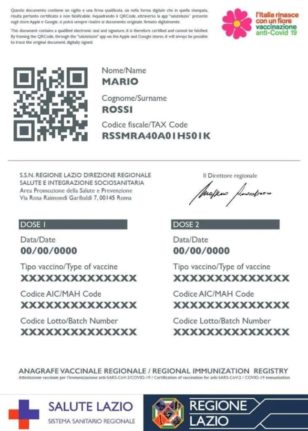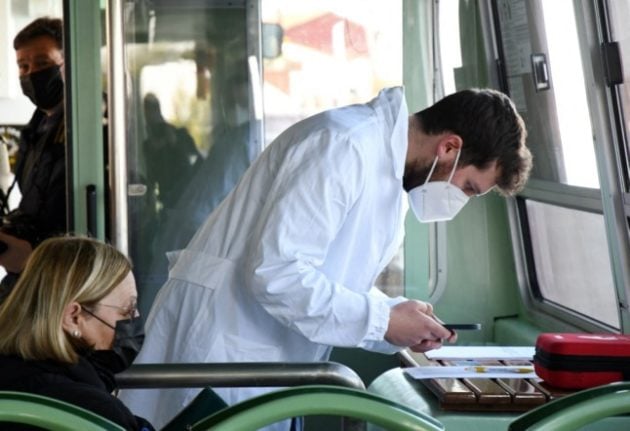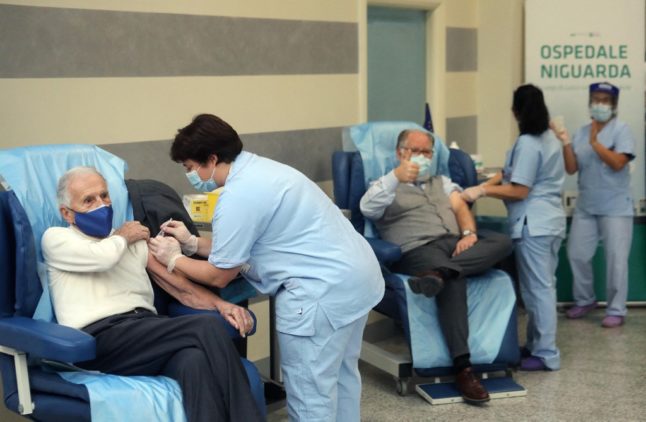With talk of a certificato verde or ‘green pass’ for travel and events in Italy, you may be expecting to receive something resembling a passport after you’ve had your jabs (and a green one at that).
But, confusingly, for the moment at least what’s being called a green pass is in fact just a regular vaccination certificate – or a negative coronavirus test result, or a statement from your doctor to say you’ve recovered from Covid-19.
READ ALSO: What is Italy’s ‘green pass’ for travel and how do you get it?
By the end of June the Italian government plans to make those details available in a standardised digital form, with a QR code that can be scanned at border controls or the entry to large events across the whole of the European Union.
If you’re getting your jabs before then – or have already had them – you’ll need to claim a vaccination certificate that will serve as your green pass in the meantime (but remember, you can’t use it for international travel yet: you’ll still need to follow Italy’s testing and quarantine rules even if you’re fully vaccinated).
While the exact procedure varies depending on where you get vaccinated, here’s a guide to the essentials.
What does an Italian vaccination certificate look like?
Vaccinations are carried out by the 20 separate regional healthcare services that make up Italy’s national health system, so certificates look a bit different from region to region.
But the Italian government set out the essential information that a vaccination certificate needs to include to serve as a green pass in its decree of April 22nd.
It should state:
- Your full name
- Date of birth
- Disease the vaccine targets – Covid-19
- Type of vaccine
- MAH (marketing authorisation holder) and AIC (autorizzazione all’immissione in commercio) codes – the international and Italian drug identification numbers
- Number of doses administered and total number required
- Date of latest dose received
- EU Member State of vaccination – Italy
- Certificate issuer
- Unique certificate identifier – a way to prove the certificate is genuine
To give you an idea, here’s what vaccination certificates look like in Lazio, the region around Rome:

Where do you get your vaccination certificate?
You should be given some kind of printed record at the vaccination centre itself, even if it’s just a provisional attestazione (‘declaration’) rather than a full certificate.
The details of your vaccination will also be added to your records with the regional health service, if you are enrolled in it. You can check them online via your fascicolo sanitario elettronico, or ‘electronic health file’, which you access via the website of your region’s health service.
You will need either a SPID digital ID or an electronic Italian ID card (CIE) to log in securely.
READ ALSO:
- What is a SPID and how do you get one?
- How to use your Italian ID card to access official services online
It can take a few days or longer for your vaccination certificate to appear in your online records. You may be able to enable an option to get notified by email whenever a new entry is added so that you don’t have to keep checking.
Once it’s there, you can download it to print out or save a copy on your smartphone.
Some regions also provide additional ways to request a vaccination certificate, including via dedicated online portals, on regional health service apps, by emailing or calling your local health authority (Azienda Sanitaria Locale or ASL), or by asking your doctor to access your records for you. Check your region’s website for details: find links here.
If none of those are an option, you need a paper copy of your vaccination certificate from the centre where you got your injection(s). If you weren’t issued one at the time, contact the centre to request one.
Do you have to be fully vaccinated to get your certificate?
The Italian government has decreed that you should be able to claim a green pass 15 days after getting your first dose, even if you need a second to be fully vaccinated.
That’s at odds with what the rest of the EU seems to have agreed upon for its bloc-wide health pass, which the EU Commission has suggested should be issued after vaccination is complete.
READ ALSO: What’s the latest on how the EU’s ‘Covid passports’ will work for travellers?
We’re still waiting for full details of how the EU scheme will work, so it’s not yet clear what the rules will be or whether other countries will accept Italian certificates issued after the first dose.
But within Italy at least, regional health services are supposed to issue certificates after just one shot. In some parts of the country, such as Lazio and Veneto, they may only give you a provisional paper version, while others – including Emilia-Romagna, Trentino and Tuscany – allow you to request an electronic copy shortly after your first dose.
How can you get the digital version for use all over the EU?
That’s not entirely clear yet, but according to plans announced by Italy’s tech chiefs this week, it should be possible to pull up a standardised vaccination certificate with a QR code on your smartphone using either IO – the government’s app for doing official admin – or Immuni, Italy’s contact tracing app.
READ ALSO:
- What’s the IO app and what can you use it for?
- Immuni: What you need to know about using Italy’s contact-tracing app
There will also be a website where you can log in using your tessera sanitaria, the healthcare card that you get when you enrol in the public health service, and download your certificate.
People who aren’t able to log in themselves can ask their doctor or a pharmacist to do it for them. Parents will also be able to download certificates on behalf of their children.
It’s unclear what the procedure will be for people who are not enrolled in the public health system and do not have a tessera sanitaria. It may be possible to access your certificate in IO using other Italian ID, such as an electronic ID card, or you may be dependent on the paper copy you receive from your vaccination centre.
As for how Italian residents who get vaccinated in other countries will have their foreign certificates recognised in Italy, that too is not yet clear. Find out what we know so far here.



 Please whitelist us to continue reading.
Please whitelist us to continue reading.
I had both vacinations in Veneto region ULSS2 and after 23 days I still haven’t received the text with the code. I used my European Health Insurance Card as I don’t have a Tessera Sanitaria. Since then I moved to Switzerland for a new job. Any ideas how to follow up getting the confirmation text so I can claim my green pass? I’m still using the same prepaid Italian mobile number so that shouldn’t be the issue. Thanks for any help or advise.
Hi Sonya,
Do you have a microchipped Italian ID card? If so you have some options to get your certificate without the code or a tessera sanitaria. Find details here:
https://www.thelocal.it/20210705/explained-how-to-get-italys-covid-travel-certificate-without-a-tessera-sanitaria/
Good luck and thanks for reading!
~Jessica